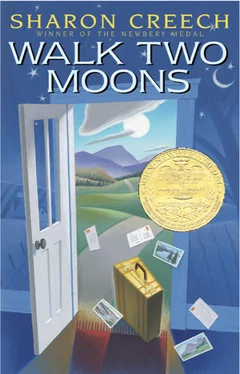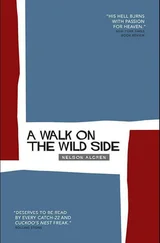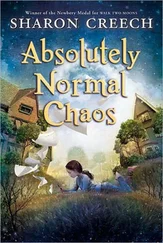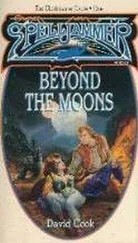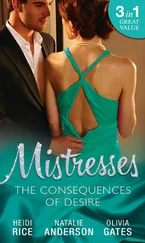Sergeant Bickle looked up at the woman seated next to us, and the corners of his mouth twitched slightly. To Phoebe, he said, “And how do you think these are related to your mother’s disappearance?”
“I don’t know,” she said. “That’s what I want you to find out.”
Sergeant Bickle asked Phoebe to spell Mrs. Cadaver’s name. “It means corpse,” Phoebe said. “Dead body.”
“I know. Is there anything else?”
Phoebe pulled out the envelope with the unidentifiable hair strands. “Perhaps you could have these analyzed,” she suggested.
Sergeant Bickle looked at the woman, and again the corners of his mouth twitched slightly. The woman removed her glasses and wiped the lenses.
They were not taking us seriously, and I felt my ornery donkey self waking up. I mentioned the potential blood spots that Phoebe had marked with adhesive tape.
“But my father removed the tape,” Phoebe said.
Sergeant Bickle said, “I wonder if you would excuse me a few minutes?” He asked the woman to stay with us, and he left the room.
The woman asked Phoebe about school and about her family. She had an awful lot of questions. I kept wondering where Sergeant Bickle had gone and when he was coming back. He was gone for over an hour. There were three framed pictures on Sergeant Bickle’s desk, and I tried to lean forward to see them, but I couldn’t. I was afraid the woman would think I was nosy.
Sergeant Bickle finally returned. Behind him was Phoebe’s father. Phoebe looked extensively relieved, but I knew it was not a coincidence that her father was there.
“Miss Winterbottom,” Sergeant Bickle said, “your father is going to take you and your friend home now.”
“But—” Phoebe said.
“Mr. Winterbottom, we’ll be in touch. And if you would like me to speak with Mrs. Cadaver—”
“Oh no,” Mr. Winterbottom said. He looked embarrassed. “Really, that won’t be necessary. I do apologize—”
We followed Mr. Winterbottom outside. In the car, he said nothing. I thought he might drop me off at my house, but he didn’t. When we got to their house, the only thing he said was, “Phoebe, I’m going to go talk with Mrs. Cadaver. You and Sal wait here.”
Mrs. Cadaver was unable to give him any more information about Phoebe’s mother’s call. All Mrs. Winterbottom had said was that she would phone soon.
“That’s all?” Phoebe asked.
“Your mother also asked Mrs. Cadaver how you and Prudence were. Mrs. Cadaver told her that you and Prudence were fine.”
“Well, I am not fine,” Phoebe said, “and what does Mrs. Cadaver know anyway, and besides, Mrs. Cadaver is making the whole thing up. You should let the police talk to her. You should ask her about the rhododendron. You should find out who this lunatic is. Mrs. Cadaver probably hired him. You should—”
“Phoebe, your imagination is running away with you.”
“It is not. Mom loves me, and she would not leave me without any explanation.”
And then her father began to cry.
“Gol-dang!” Gramps said. “What a lot of birds of sadness wing-dinging their way around Peeby’s family.”
Gram said, “You liked Peeby, didn’t you, Salamanca?”
I did like Phoebe. In spite of all her wild tales and her cholesterol-madness and her annoying comments, there was something about Phoebe that was like a magnet. I was drawn to her. I was pretty sure that underneath all that odd behavior was someone who was frightened. And, in a strange way, she was like another version of me—she acted out the way I sometimes felt.
I do not think that Phoebe actually planned to break into Mrs. Cadaver’s house, but as Phoebe was going to bed, she saw Mrs. Cadaver, in her nurse’s uniform, get into her car and leave. Phoebe waited until her father was asleep, and then she phoned me. “You’ve got to come over,” she said. “It’s urgent.”
“But Phoebe, it’s late. It’s dark.”
“It’s urgent, Sal.”
Phoebe was waiting in front of Mrs. Cadaver’s house. There were no lights on at Mrs. Cadaver’s. Phoebe said, “Come on,” and she started up the walk. I admit that I was reluctant. “I just want to take a quick look,” she said. She crept up onto the porch and stood by the door. She listened, tapped twice, and turned the doorknob. The door was unlocked.
I don’t think Phoebe intended to go inside, but she did, and I followed. We stood in the dark hallway. In the room to the right, a shaft of light from the streetlamp came in through the window. We went into that room. We both nearly leaped through the window when someone said, “Sal?” I started backing toward the door.
“It’s a ghost,” Phoebe said.
“Come here,” the voice said.
As my eyes adjusted to the dim light, I could see someone huddled in a chair in the far corner. When I saw the cane, I was relieved. “Mrs. Partridge?”
“Come over here,” she said. “Who’s that with you? Is that Phoebe?”
Phoebe said, “Yes.” Her voice was high and quivery.
“I was just sitting here reading,” Mrs. Partridge said.
“Isn’t it awfully dark in here?” I said, bumping a table.
Mrs. Partridge laughed her wicked laugh. “It’s always dark in here. I don’t need lights, but you can turn some on if you want to.”
As I stumbled around looking for a lamp, Phoebe stood, frozen, near the doorway. “There,” I said. “That’s much better.” Mrs. Partridge was sitting in a big, overstuffed chair. She was wearing a purple bathrobe and pink slippers with floppy bunny ears at the toes. On her lap was a book, her fingers resting on the page. “Is it Braille?” I asked, waving at Phoebe to come into the room. I was afraid she was going to run out and leave me.
Mrs. Partridge handed me the book, and I slid my fingers over the raised bumps. “How did you know it was us?” I asked.
“I just knew,” she said. “Your shoes make a particular sound and you have a particular smell.”
“What’s the name of this book? What’s it about?”
Mrs. Partridge said, “ Murder at Midnight. It’s a mystery.”
Phoebe said, “Erp,” and looked around the room.
Each time I went into that house I noticed new things. It was a scary place. The walls were lined with shelves crammed with old musty books. On the floor were three rugs with dark, swirly patterns of wild beasts in forests. Two chairs were covered in similar ghastly designs. A sofa was draped in a bear skin.
On the wall behind the couch were two thumpingly grim African masks. The mouths on the masks were wide open, as if in the midst of a scream. Everywhere you looked there was something startling: a stuffed squirrel, a kite in the shape of a dragon, a wooden cow with a spear piercing its side.
“Goodness,” Phoebe said. “What a lot of—of—unusual things.” She knelt to examine a spot on the floor.
“What’s the matter?” Mrs. Partridge said.
Phoebe jumped up. “Nothing. Nothing whatsoever.”
“Did I drop something on the floor?” Mrs. Partridge asked.
“No. Nothing whatsoever on the floor,” Phoebe said. Leaning against the back of the sofa was an enormous sword. Phoebe examined the blade.
“Careful you don’t cut yourself,” Mrs. Partridge said.
Phoebe stepped back. Even I found this unsettling, that Mrs. Partridge could see what Phoebe was doing even though she couldn’t actually see her.
Mrs. Partridge said, “Isn’t this a grandiful room? Grandiful—and a little peculible, too, I suppose.”
“Phoebe and I have to be going—” We backed toward the door.
“By the way,” Mrs. Partridge said as we reached the doorway, “what was it you wanted?”
Читать дальше
